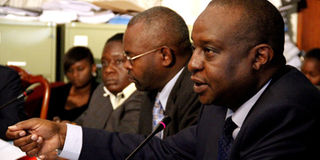Intrigues of lucrative government tenders

Treasury Cabinet Secretary Henry Rotich (right) with PS Kamau Thugge (left). PHOTO | DIANA NGILA | NATION MEDIA GROUP
What you need to know:
- Mr Yang Yong alias Thomas and Zou Lingying alias Eileen were at the centre of a protracted multi-billion-shilling security tender battle between ZTE Corporation and another Chinese company Huawei Technologies, that dated back to 2012.
- Officially, the government tendering process takes between three to six months to award.
- Duale explained that although the National Assembly Speaker has previously allowed two committees to investigate the same issue, he believes that it is a waste of public funds since the committees have the same documents.
When two Chinese executives working for the ZTE Corporation in Nairobi were picked up from their houses in the wee hours of the morning, detained and quietly deported a few weeks ago, it could have passed as a simple case of undesirable foreigners being ejected from Kenya.
But it later emerged that the two — Mr Yang Yong alias Thomas and Zou Lingying alias Eileen — were at the centre of a protracted multi-billion-shilling security tender battle between ZTE Corporation and another Chinese company Huawei Technologies, that dated back to 2012.
However, while the case was proceeding in court, Safaricom partnered with Huawei to work on a proposed Sh12 billion project to install a high-tech security system that includes CCTV cameras to fight rising insecurity in Nairobi and Mombasa. The project has the backing of President Uhuru Kenyatta but is also the subject of parliamentary inquiry.
The puzzle of the deportation of the ZTE executives, ordered by Interior Cabinet Secretary Joseph ole Lenku, intensified when it later emerged they may have lobbied Parliament to investigate the Huawei link to the tender awarded to Safaricom.
But why they had to be deported remains unresolved.
The intrigues that afflict the security tender are now typical of many big money tenders floated in government where brokers, top government officials and businessmen have reduced the tenders to basic money-maker machines and in the process delaying development.
The latest controversies involve the Sh327 billion standard gauge railway, Sh24 billion laptop tender, Sh4 billion NSSF Tassia project, the Sh43 billion Kenya Pipeline Corporation construction deal, and the building of offices in Nairobi for legislators at a cost of Sh5.3 billion.
The numerous cases lodged at the Public Procurement Oversight Authority (PPOA) and the High Court challenging the awards attests to the competitiveness of the tender awards and the cut-throat business it has become.
In some instances, death threats are issued against those thought to be blocking the big deals. Last week, a KPC manager received a bullet in an envelope with a letter condoling with him over his supposedly impending death.
SIX MONTHS
Officially, the government tendering process takes between three to six months to award. However, it can take more than one year for a project to start if it is contested at the Public Procurement Administrative Review Board, Parliament or in court.
And if the award is cancelled due to irregularities, it will take a longer period to restart the process. That is the fate of the laptop project, a key Jubilee administration promise, which is now in the High Court after being stopped by the review board.
On Saturday, Leader of Government Majority in Parliament Aden Duale said that Parliament, PPOA and the courts have an oversight role which is enshrined in the Constitution. But he urged the institutions to resolve disputes within a reasonable time.
“While working within their roles which are enshrined in the Constitution, they should not delay investigations for too long because this delays development,” says Mr Duale.
He also explained that although the National Assembly Speaker has previously allowed two committees to investigate the same issue, he believes that it is a waste of public funds since the committees have the same documents.
“The committee’s mandate falls under the Speaker’s and clerk’s office. Two committees can seat jointly and investigate an issue. However, I think one committee should be able to do the job adequately. It’s a waste of resources for two committees to probe the same thing at the same time,” says Mr Duale.
However, some in the business community argue that the long investigations or review processes are aimed at extorting money from them. According to a businessman who spoke to Sunday Nation but did not want to be named, companies bidding for big tenders can spend up to Sh800 million in bribes to government officials, MPs and brokers to influence tenders and contract award at various stages.
“There was a bit of sanity and predictability in the President Kibaki era. But with Jubilee it’s jungle warfare. Top government officials are ruthless and reckless. Kenya is in deep trouble,” says the businessman.
Another business executive said top government officers ask for a cut upfront for the big tenders and it does not matter whether one win’s the award or not because the next person in line is willing to pay.




